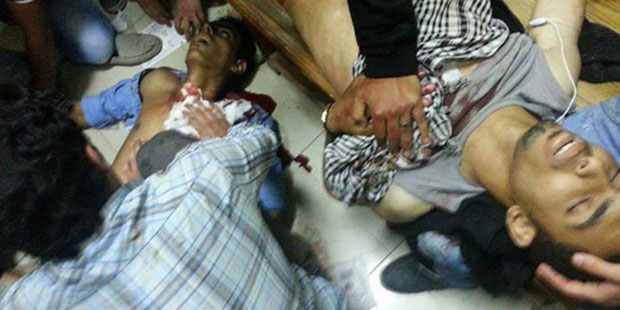Amr al-Sayed, a photojournalist for Sada el-Balad, and Khaled Hussien, a reporter for Youm7, were both shot on Monday while covering clashes between students and security forces at Cairo University, according to media reports.
Their injuries shed light on an increasingly dangerous environment for reporters and photojournalists in Egypt, which is reaching a critical point.
Sayed suffered from gunshots in the back, Sada el-Balad reported, while Hussein was shot in the chest, Youm7 reported. Both news agencies said that their reporters were in stable condition after undergoing emergency operation.
Reporters in danger
In March, Mayada Ashraf, a young journalist working for Al-Dostour newspaper, was shot dead while covering similar clashes, sparking rage among journalists who objected to their lack of protection from the institutions they work for.
A gas mask is typically the only safety equipment provided to a field reporter by their newspaper, Mostafa el-Sayed of Al-Masry Al-Youm newspaper told The Cairo Post.
Following Ashraf’s death and demands for more protection, the Press Syndicate and the Ministry of Interior agreed to supply 100 bulletproof vests to journalists. However, journalists are not convinced that this would be enough to protect them.
“A bulletproof vest? Apart from being expensive, those vests would probably be more trouble than protection to journalists, who would be immediately identified and targeted in clashes,” Sayed added.
Most field reporters argued after the January 25 Revolution, and again after the events of June 30, that violence against them has increased, whether from protesters or security forces.
“The journalist is responsible for his own life,” said Mohamed Antar, a 26-year field reporter who works for Al-Shorouk newspaper, adding that there cannot be a specific safety plan because “incidents come unexpectedly, usually from both sides of the sudden conflict using gun and birdshots.”
Danger is often more imminent for photojournalists, Antar added, because they are everyone’s target as soon as the camera is spotted.
Lobna Tarek, a photojournalist for El Shorouk newspaper, told The Cairo Post she stopped covering life-threatening events out of fear particularly since photojournalists are subject to assaults both from protesters and from security forces.
“While covering, I begin shooting, and then usually protesting students ask me to stop taking pictures of them because they see me as the media who will label them as ‘terrorists.’ On the other hand, security forces assault photojournalists and confiscate their cameras. I choose to leave at the right moment before it costs me my life,” Tarek said.
“No picture is worth a life,” she added.
On January 26, El-Wady News published a report of all assaults on journalists that occurred in one day, during the commemoration of the January 25 Revolution. At least 19 reporters and photographers were arrested, cameras were seized, and seven others including foreign reporters were assaulted by protesters, in addition to gunshot injuries for two reporters.
Reporters need protection
The Press Syndicate has condemned repeated attacks on journalists, and its president Diaa Rashwan called for a protest on Thursday at the syndicate and a strike from field reporters until their demands are met.
“I demand the Attorney General launch immediate investigations into the cases of reporter shootings, and I also call on media institutions to respond to the syndicate’s initiatives aimed at providing protection to reporters during the coverage of dangerous events,” Rashwan told The Cairo Post on Monday.
Antar said Rashwan’s initiative is “a positive step toward escalation on the issue,” although he believes that there should be further action.
“The syndicate must impose rules, restrictions and penalties on media and newspaper institutions to force them to take care of journalists,” Antar told The Cairo Post.
According to Rashwan, newspapers and news websites are responsible for the safety of their journalists, and they often “fail to properly protect their reporters.”
One of the basic rights for reporters is to be officially hired by their institutions, which would provide them with social and life insurance, he said. Rashwan said he has called for that action over and over again but with little response from the various newspapers.
“Taking this step means legally and professionally recognizing field reporters,” Khaled Salah, editor-in-chief of Youm7, said in press statements on Monday evening.
However, the Committee to Defend Press Independence in Egypt blamed the syndicate’s lack of action. “Facing a campaign of attacks against journalists will not be solved by protesting or filing lawsuits. The syndicate’s council should be more focused and dedicated to journalists’ issues,” it said in a press release on Monday night.
The committee also condemned the shooting of Hussein during the clashes.
“[The shooting] is only an episode of an ongoing series of attacks targeting reporters to silence them and prevent them from conveying facts to public opinion,” the statement read.
At the same time, journalist Nafisa el-Sabagh criticized journalists for complaining without attending the syndicate’s general assembly meetings to discuss their problems, adding in remarks to The Cairo Post that 7,500 registered journalists are entitled to vote on syndicate decisions.
“In the last meeting, only 13 people attended, including three members of the syndicate’s council and five reporters in charge of covering the syndicate news, which leaves only 10 journalists attending,” Sabagh added.
The debate surrounding the Press Syndicate is not the only complication that has revealed itself. Following Monday’s incidents, more direct accusations addressed the Ministry of Interior’s role, regarding assaults on reporters and the excessive use of force.
“Why would the police use live ammunition on students inside a university campus?” Salah stated during his Monday program on Al Nahar TV, during which he addressed the Deputy Interior Minister for Central Security Forces, confirming that Youm7 will legally pursue the Interior Ministry.
According to Sayed, the Press Syndicate should officially address the Ministry of Interior to coordinate and establish a mutual agreement or protocol ensuring reporter safety on the job.
Between having to work undercover and fearing being exposed, currently “journalists are responsible for their own lives,” Antar said.

